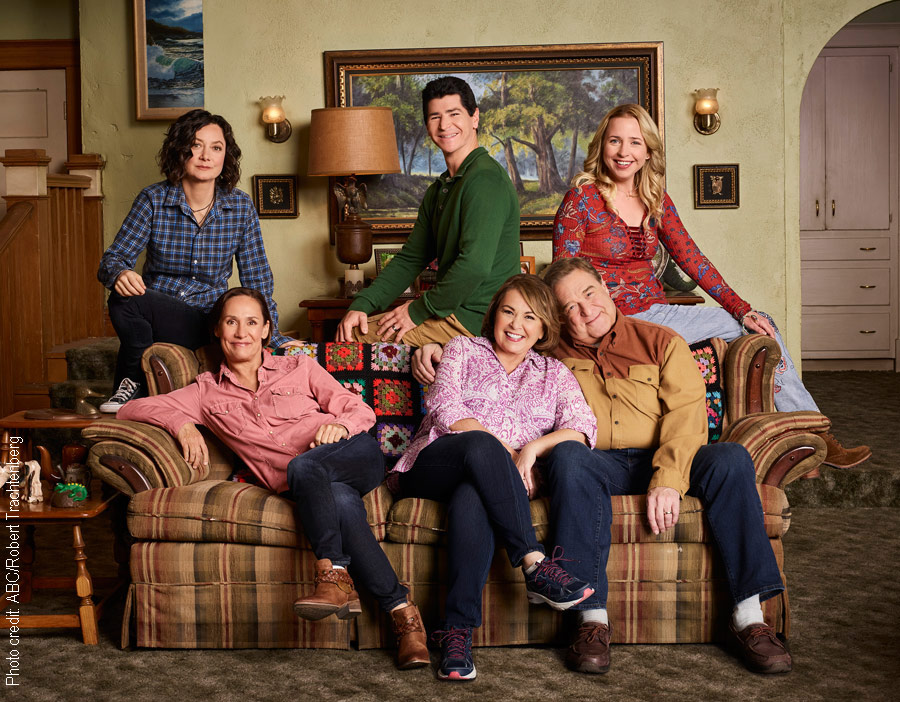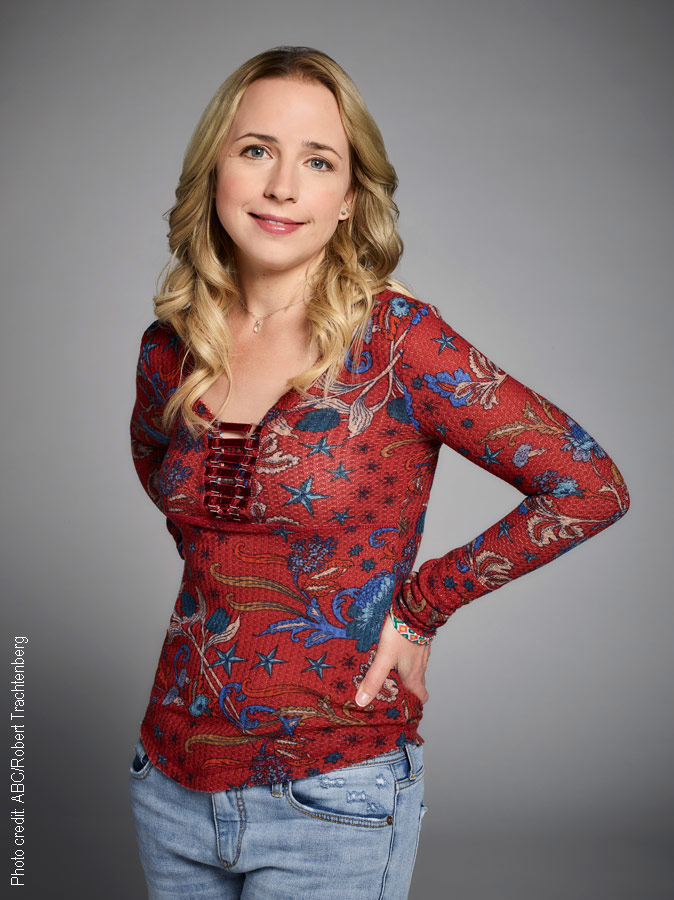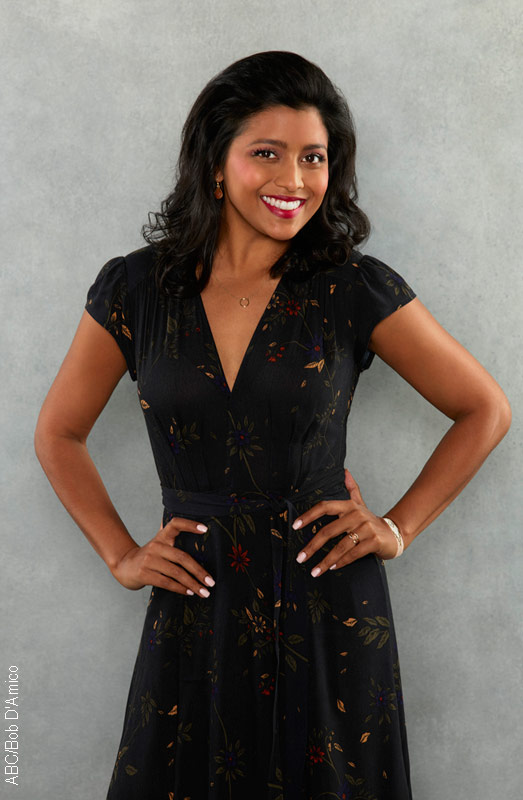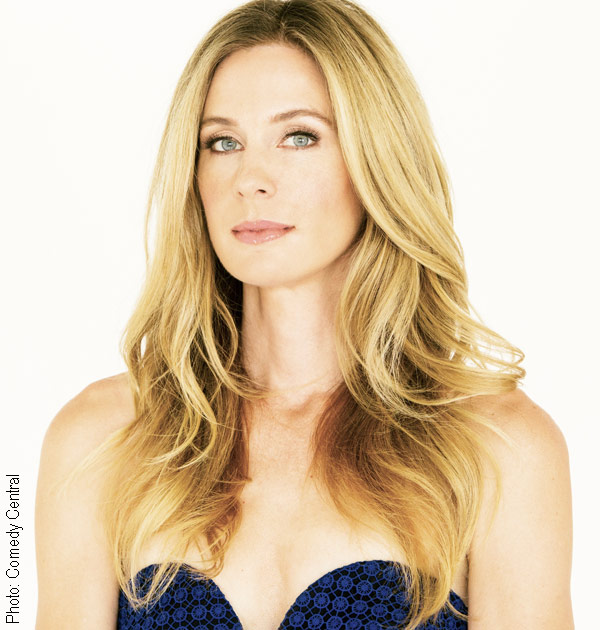 This Spring, women are ruling the medium of television. They’re portraying layered, complex characters on sitcoms that range from vintage reboots to progressive family dynamics, and the dark yet humorous things we do to succeed in the workplace.
This Spring, women are ruling the medium of television. They’re portraying layered, complex characters on sitcoms that range from vintage reboots to progressive family dynamics, and the dark yet humorous things we do to succeed in the workplace.
Three standouts include actress Lecy Goranson, who steps back into her role as Becky Conner on an ABC Network reboot of the iconic working-class sitcom, Roseanne; Tiya Sircar, who plays Zach Braff’s professionally-driven and supportive wife Rooni on the new ABC sitcom, Alex, Inc.; and Anne Dudek, who plays the brazen, passive-aggressive, Kate, on Comedy Central’s new breakout hit, Corporate.
I had a chance to sit down with each of these talented ladies to get their take on the evolution of the American sitcom, and how female television characters have come a long way. ~Allison Kugel
Catching Up with Roseanne’s Lecy Goranson
When you stepped off the Roseanne set for the last time in 1997, did you ever think, in a million years, that you’d be playing Becky Conner all these years later?
LG: No (laughs), I didn’t! Being back has made me realize the time I missed when I was away. It’s an interesting feeling that hit me, that the show continued without me. Everyone was still together after I left. I had a lot of mixed feelings about it. Not regret, but I thought, “Wow. I really love these people and I made a move, but it’s been such a blessing to be reconnected with everyone.”
You’re referring to your character being recast with actress Sarah Chalke during the fifth season of Roseanne. There are three characters in television that were famously recast during the height of a show’s success. Darren on Bewitched, Lionel on The Jeffersons and Becky on Roseanne. Have you talked to Sarah about what it was like for her to take over your role all those years ago?
I never really had a chance to talk to her until we were on Amy Schumer together. We went out to dinner and it was interesting to hear what she had to say, which was a lot! Anyone who gets a job like that, it’s very exciting, especially if you’re a small-town girl from Canada, which she was. I can only imagine how intimidating that was for her, beyond the sheer joy of having a job like that. Stepping into a character that was already established, it was challenging for her. But she stepped into an environment where there were a lot of loving people, and talented people to help her bring her game up.
I’ve heard you say in interviews that you left Roseanne during the height of its success to have a normal college experience. What prompted you to become a child star in the first place?
I was a dancer and there’s a place in Evanston, IL called the Noise Cultural Arts Center where they have dance, acting, painting and different classes in the arts. I was taking dance classes, and right down the hall was the Piven Theatre Workshop, started by Byrne and Joyce Piven who were coming from The Second City [Comedy Troupe]. I started taking classes there and Burt and Joyce were affiliated with an agency in downtown Chicago. They asked me to go on a couple of open calls. My parents wanted me to be involved in activities because they were working a lot. So that was the amount of their vested interest, just to keep me busy and productive. I did two auditions and the second one was for Roseanne. I think they hired Laurie Metcalf, who was also from Chicago, and me, because they wanted to have some actors that were actually from the Chicago area to give the show that flavor. But yeah, it was a total fluke.
Now it makes sense to me that you would one day, as a young adult, realize you wanted to step away and just be a college student.
Yes. But after college I had to say to myself, “Look, you love being an actor and this lifestyle of suffering (laughs). This is what you really want.” It’s funny when you have to parent yourself.
Twenty years later, what are you now bringing to the role of Becky Conner on this Roseanne reboot?
I’ve been doing theatre for so many years. Like any skill, you build muscle by repetition. I’ve also had the privilege of working with great actors in the New York theatre community. The character of Becky is really strong, grounded and wise. It’s interesting re-approaching a character in this way, with all of my own life experiences. And I feel it when I am there; I feel my age! I’ve been around the block, but I think back to my former self as a child and I think, “What was it like?” It’s hard for me to remember a lot of it. There is a part of youth that is so unconscious, and there’s such a beautiful thing about that in retrospect. That unconsciousness gives you a lot of bold confidence.
As an adult, have you sat and watched the old Roseanne re-runs? And do you feel connected to it?
This is a bit of an inside joke. I feel like, “Oh yeah it’s me, but it feels like it is so long ago and distant. Michael [Fishman] and Sara Gilbert have children, and they would sit down with their kids to watch the episodes and tell their kids, “This is what I used to do.” I haven’t really done that. Although you can’t stay away from it, because it’s on so often if you’re flipping through the channels. One of the interesting things about re-visiting the show is to not only have memories come back for me, but to hear other people’s memories, and then to also have this shared feeling come up sometimes of, “We don’t remember anything at all!”
Tell me about growing up with Roseanne Barr and John Goodman as your TV parents and spending countless hours with them as you were growing up.
I’ve always felt really close to John. Our personalities are similar, and I have always felt very connected to him. I hate to use the term “genius” because people throw it around, but they both do have a genius for the work. Roseanne, the way her mind thinks comically, is really advanced. And John is such an incredible actor. His genius is in being so present in every moment and tweaking the script in his own way. He is one of the most present actors I have ever been around. The two of them together are just like a couple of big kids, encouraging each other to go further. They are a great team, and they bring out the best in each other. There is a side to both of them that is just total goofball, and they both love humiliating the kids in a scene. Yes, they got off on embarrassing us. Now that we’re all back together I remember just how much we always laughed.
How about your TV siblings Sara Gilbert and Michael Fishman, who play Darlene and D.J.? What’s the relationship like between the three of you?
I live on the East Coast and they’re on the West Coast. Apart from Laurie Metcalfe and John Goodman who do theatre in New York occasionally, I don’t see everybody that much. Sara and I are very close. We spent all this time apart and then when we were reunited, I remembered how well we know each other. You can’t help but be close like that if you see each other every day for however many years, and you’re the only two young ladies on the set. Michael is just a doll. He’s turned into such a mature, loving, wonderful person. I feel a lot of pride for the fact that we have turned out pretty good.
How did a Roseanne reboot come together?
It had a lot to do with Sara. I also know that Roseanne was thinking about doing it for a long time, independently. Michael and Roseanne had been talking about it. It all came together, and Sara took on the role of Executive Producer. When Sara reached out to everyone, we all said, “Let’s do it!”
I love the fact that everyone was game to do it. If you are known and beloved for playing an iconic television character that people identify with, and you are a part of pop culture history, that’s amazing! What’s wrong with that?
I think also the fact that our show is about a family, that there is something appealing about keeping that family unit alive and revisiting them at a later time. Of course, Roseanne is a special show to me, but I do think it’s a special show to a lot of people and the family dynamic that we have makes it special.
Does this Roseanne reboot bring the same flavor, and the same meat and bones as the original?
Oh, absolutely! There are certain episodes we did where we all thought, “This is vintage Roseanne.” It felt like an original episode.
Why should people tune in to watch the Roseanne reboot?
Because it’s the best show on TV, of course!
---------------------------
Tiya Sircar is Zach Braff’s Better Half on ABC’s Alex, Inc.
Tell me about the new series Alex, Inc. in which you play Zach Braff’s wife, Rooni.
TS: It’s based on the real life and family of Alex Blumberg, who founded the podcast company, Gimlet Media. Zach [Braff] plays Alex, who is in his late thirties, very successful in his career, he’s got a wife and two kids. He decides that he wants to quit his job and start a podcast company, so he can tell stories that he feels are meaningful. In real life, Alex Blumberg did exactly that. He quit his job at NPR, where he was producing successful podcasts like Planet Money and This American Life, and he set out to start his own company. The very first independent podcast he produces on his own is him quitting his job, starting this new company and breaking the news to his wife. Our show follows that journey.
The show is inspired by Alex Blumberg’s real story, but you take some creative license.
It’s loosely based on Alex Blumberg’s real life, but we follow our own creative path with it. The show is essentially about following your dreams, about family, and I play Rooni, Alex’s wife. Rooni is a successful public defender, so she has a career that she loves and is passionate about. Now Alex is doing his podcast company, which he is super passionate about. But meanwhile, they have these two kids that they want to do right by. It’s a balancing act getting this company going and figuring out what that means for the family.
Alex, Inc. is tailor-made for a millennial audience. You’ve got the incubator where Alex works on his startup, and all these young people creating outside-the-box inventions. What’s your take on practicality versus following a dream?
I am the child of Indian immigrants, both of whom have PHDs and are college professors, and I’m an actor in Hollywood. I’m not of the mind where it doesn’t matter what you care about, you’ve got to have a safe reliable job and do the 9 to 5. I obviously don’t subscribe to that. There’s nothing wrong with that, though, if that’s what you want to do. One of the things I love about our show is that there are so many films about young people who are just out of college and want to pursue their dreams. It’s rare, in my opinion, that we get to see someone who is in his late thirties, with a wife and children who he has to support, realizing that what he is doing is not fulfilling him in a way that he really wants. He knows what will and he goes after it. The moral of the story is that you don’t have to grow complacent. If there is something that you are passionate about, you don’t have to wait to try and pursue that dream.
I’m assuming that part of the comedy is in how all of the characters surrounding Alex respond to his taking this big career risk.
My character, Rooni, has a mom who is a lot like my own parents; risk averse. In our south Asian culture, very often it’s, “Who cares if you like this thing. Be a doctor.” There’s a lot of that. The audience will see that struggle, where Rooni’s mom comes to visit and she is very disapproving of Alex’s decision to quit his reliable job to go out and do this crazy dream.
I love that television is showing so much diversity in families now, and Alex Inc. does portray a multiracial/multicultural family. Tell me how you feel about portraying a family that is part Caucasian, part south Asian with multiracial children, on prime-time television.
I’m thrilled that there is this multicultural family on network, prime-time television. When I was growing up, I was acutely aware that I never actually saw anyone that looked like me on television. Probably the only south Asian character when I was a child was Apu on The Simpsons. The Simpsons is great, but that characterization is not exactly what we are going for in how we’re represented.
On Alex, Inc. you play opposite Zach Braff and Michael Imperioli, who both seem to get the punchlines. Your character, Rooni, seems to be more of the “straight man.” Tell me about that dynamic.
They are both so skilled at comedy, which is funny, because you watch Michael on The Sopranos and it’s a testament to how talented he is. It’s so hard for me to not break character when we’re in a scene together. Everything he says, even when he’s not especially trying, it’s so funny. And Michael has some of the best lines on the show. Working with Zach is wonderful. I’m a fan of Scrubs and Garden State, and he is a super talented actor and obviously super funny. I didn’t know how he would be to work with as a director, and he’s also our executive producer, so he’s wearing multiple hats. It’s impressive to watch him go from directing a scene to being in a scene, and then also taking a step back and wearing his producer hat.
How does the show depict Startup culture from Alex’s perspective?
The incubator scenes are really funny. There are often new startups that are renting space in this incubator, so we get to see some of their prototypes or their products. It’s not meant to make fun of, but to have a good-natured laugh and have fun with some of the zany ideas. And then you see who is running these startups. They look like they’re probably teenagers (laughs), or maybe 22 years old. That also plays into the fact that Alex is not your typical startup founder. There’s a tangible difference in age and his place in life, and that is part of the joke as well.
You voice the character of Sabine on the animated series, Star Wars Rebels. Is there any talk of an animated Star Wars Rebels movie?
Oh my gosh, I hope so! That would be so wonderful. I can’t imagine that any of us would be opposed to that. We all love making the show. We’re all sad that the show is ending after this season. So yeah, if there was some way of continuing the story in a feature format that would be fantastic. Let’s put that out there in the Universe.
---------------------------
Anne Dudek Takes on Corporate Culture for Comedy Central
Describe the Comedy Central series, Corporate, for those who haven’t yet tuned in.
AD: Corporate centers around the lives and perspectives of two junior executives in training, Jake Weisman, and Matt Ingebretson, who also co-created the show. It’s a deeply cynical view of capitalistic, corporate culture. I play a higher up executive. It’s a workplace comedy unlike the traditional happy, cheery sitcom. It’s a darker view of how we relate to each other in the workplace.
What social and societal commentary is the show is trying to make?
We’re portraying people who are warped by the demands of trying to succeed, when the values are all about power and money at the expense of your soul. On one hand, it’s upsetting, but on the other hand it’s really funny, because of its absurdity. The humor is born out of how absurd our lives can become when these are the central values of our work life.
Have you ever held an office job along the lines of what’s portrayed on the show?
One of the main triumphs of my life is that I haven’t experienced that 9 to 5 job that felt endlessly despairing. Though being an actor is a difficult life sometimes as well. I think anybody in the modern workforce has had an experience with being asked to be a certain way, to succeed, that feels inherently a little depressing.
Your character, Kate, can’t seem to decide if she thrives on office politics or if she is depressed by it.
She’s a woman in the workforce, and she’s in a culture dominated by men, set up under a male set of rules. It’s a patriarchal mindset and dynamic. We’re in a cultural moment of understanding how women have been in such a place of disadvantage, especially in the entertainment community, and especially with the sexual dynamic of what’s to be expected just to get work. There’s a parallel to things that my character has experienced, whether or not it has been something that extreme. But you have to fight amongst men in a particular kind of way.
What would you say that does to a woman, psychologically?
Any time you’re forced to only use one aspect of yourself that’s deemed as valuable to achieve other goals that you have, it’s pretty demoralizing. With actresses, that has at times been their sexuality, their youth, their charm. In the case of my character, Kate, on Corporate, she’s had to adapt to a masculine set of ideals. She’s had to be super aggressive and very unempathetic and goal-oriented in that traditional kind of hyper-masculine way.
What would you say is your own most extreme personality trait?
I do share a kind of darkness with Jake Weisman, who plays Jake on the show and is also a creator of the show. I related to that fatalistic, darker world view when I first read the script. There’s an intelligence behind it that I really admire. I personally can relate to that dark humor.
What is the audience takeaway from watching Corporate?
Stories serve a good purpose when the audience can say, “How do these people know about my experience?” It’s that connection when people see the truth of their own life shared by people portraying it on television. I’ve gotten so much feedback from people who do have that kind of corporate job, and they are like, “This is so accurate to what I have experienced, and I’ve never seen it portrayed so clearly.” And it’s a commentary about what we choose to do with our lives to earn money, and what America has become.
Do you think there is a cautionary tale within the context of the show about not forgoing your dreams to make a living?
I think that’s a very privileged perspective. The reality is a lot of us don’t have a choice. There aren’t a wide variety of ways to make money that are ultimately fulfilling to people. There is an aspect of working that is purely about survival. My mom has a real interest in archeology, and she was telling me that what archeologists have pieced together is that most people lived in poverty for most of human existence. Right now, we’re looking at our modern culture and what we’re doing to survive is, on some level, we’re selling our souls to this greater capitalistic ideal of success at all costs.
I think one moral of the story is that even if your job is not your passion, it’s important to pursue what feeds your spirit when you aren’t working. Just because it’s not where your paycheck comes from doesn’t mean you can’t pursue it.
There might be a greater story about how many hours people are expected to work in this day and age, just to survive at a basic level. So, what does that do to your soul, and your ability to find other outlets for what makes you happy? There’s an episode called “Weekend” in Corporate that deals with people’s lives outside of the corporate world, and it’s not very pretty (laughs). Sometimes people are working to work. You’re working for the car that you use to get to work. You’re working for the clothes that you have to wear to work. It’s an absurd reality and I really appreciate that this show picks up on that absurdity.
What is the humor aspect that runs through each episode?
The dark, dry accuracy of some of these moments. It’s like pulling out these little sparkly diamonds from a necklace, setting them all together, and saying, “Look at how powerful this is.” Our show heightens what is absurd about corporate life, and what’s absurd is really funny.
You’ve appeared in so many films and television shows over the years. What role do people most often recognize you from?
White Chicks!
Oh my God, yes (laughs)! I thought I was the only one! How do you feel about being recognized for that movie?
That movie has stood the test of time in a way I never could have predicted. I’ll walk into a Starbucks, and someone’s like, “White Chicks! I love White Chicks!” And I just love that. I never would have thought that movie would have made the lasting impact it’s made.
You have a tremendous resumé of roles. Right before this interview I was thinking, "I’m not going to be weird and mention White Chicks, because she’s done so much since then."
That’s why I’m excited to be doing comedy again, because it has a profound impact on people and a really important place in our world. I do love being recognized for that.
When you make people laugh, you leave an indelible mark on their spirit.
It’s a very certain way of knowing that you and another person relate to each other; you both found that funny. It’s a cool connection.
Why should people tune in to watch Corporate on Comedy Central?
Because it’s extremely intelligent and provides real laughs. It’s a different kind of comedy from what is available out there right now, talking about our current culture.
Allison Kugel is a syndicated entertainment and pop culture journalist, and author of the book, Journaling Fame: A memoir of a life unhinged and on the record. Follow her on Instagram @theallisonkugel.
Is Ottawa considered a small town? It's a city. It's the capitol of Canada. I find Lecys comments insulting. Would she like it if we called Washington DC a small town? Typical ignorant Yank.